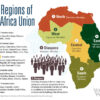Follow
X
Follow
Last week Friday, a few ICTR alumni continued a discussion about the Palestinian-Israeli conflict via WhatsApp. One ICTR alumni wrote, “Did 40,000+ Palestinian men, women, and children have to die for Netanyahu to achieve the myth of the land allegedly promised by God? And why do the Jews blame Hitler and the Nazis for Holocaust whereas the world is currently witnessing conduct – which amounts to genocide – being perpetrated by the Jews (who claim to be victims of the Holocaust)? And – if I may ask – which land on Planet Earth was not promised by God? Where is it located?” He continued, “Ask the silent believers of the Abrahamic religions. They are deafeningly silent about the current genocide perpetuated by the Israelis. Hypocrites.”
I responded by saying that several religious leaders in America have been speaking out against the ongoing Israeli military actions in Gaza. These leaders come from various religious backgrounds and have voiced their concerns about the humanitarian crisis unfolding in the region. I also shared how my pastors at the Abyssinian Baptist Church in NYC have advanced degrees. I always felt they had a different perspective that enabled them to teach and give sermons that beautifully connect the Bible to current events in modern times. After watching Sunday’s sermon, I wanted to write a blog post about pastors with global compassion. Here we go…
God can call and use anyone for ministry, regardless of background, status, or abilities. Throughout Scripture, God chose ordinary, imperfect people—like Moses, David, and Paul—to carry out His divine purposes. God looks at the heart, not outward qualifications, and equips those He calls. His grace transforms weaknesses into strengths, empowering individuals to serve in ways they may never have imagined.
Religious leaders will tell you that being called into ministry is a profoundly personal and spiritual experience guided by God’s clear purpose. It requires humility, prayer, and discernment to align their hearts with God’s will. A true calling is marked by a passion to serve others, a commitment to share the gospel, and a readiness to sacrifice for the kingdom’s sake. This calling is affirmed through spiritual gifts, the support of the church community, and a desire to reflect Christ’s love in all areas of life.

Photo by Michel Raguin.
Most church leaders I follow in the U.S. hold graduate or postgraduate degrees. I have always felt that this advanced education gives them a unique perspective and the ability to connect biblical teachings to current events and modern times. Ministers with advanced degrees—such as a Master’s, PhD, Doctor of Ministry, or Doctorate in Theology—are often more likely to adopt a global and socially inclusive approach to theological issues. Their academic training exposes them to a broad range of historical, cultural, and ethical contexts, enabling them to engage with scripture in ways that emphasize social justice, equality, and the global community.
This broader outlook contrasts with a more literalist interpretation of the Bible that might focus exclusively on passages declaring the Jews as God’s chosen people, potentially overlooking the complexities of modern geopolitical realities. In contrast, pastors with advanced educational training can offer a more nuanced and compassionate understanding of scripture, applying it to contemporary issues to promote inclusion, justice, and love for all. Their education equips them to approach complex challenges like poverty, inequality, and systemic oppression with a deep understanding of the interconnectedness of humanity and a solid commitment to the marginalized.
By blending spiritual calling with academic insight, these pastors help bridge the gap between faith and modern reality. They inspire their congregations to move beyond local concerns and engage with global issues, encouraging compassion for the oppressed, the downtrodden, and the forgotten.
In conclusion, pastors with advanced educational training bring a unique ability to connect the timeless truths of scripture with the urgent needs of today’s world. Through their leadership, they offer a vision of Christianity that speaks to the hearts of people everywhere, especially the oppressed, by embodying the global compassion that Christ calls us to. Their education deepens their theological understanding and amplifies their capacity to serve the least of these in meaningful and transformative ways.


















